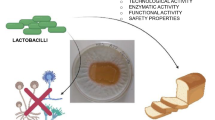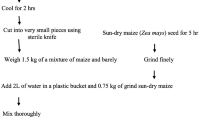Abstract
Wadi is a hollow, brittle, ball- or cone-shaped popular traditional legume-based product of many countries in the Indian Subcontinent. To prepare wadi, blackgram (Phaseolus mungo L.) dhal (dehusked split seeds) was soaked, ground to a soft dough, fermented for 10 h in a closed container, moulded into balls or cones and dried for ~60 h (repeating a cycle of 8 h sun-drying at 29–33 °C and then 16 h shade-drying at 28–30 °C). This study aims at understanding the fate of some selected foodborne bacterial pathogens during a chance contamination of blackgram dough at the time of preparing wadi. Uninoculated dough, during the course of its processing to wadi, remained free from Staphylococcus aureus and Escherichia coli, but got contained by Bacillus cereus during the first 10 h of fermentation and also the next 24 h of drying wadi. B. cereus, when spiked into freshly prepared dough at a load of 5.2 log cfu/g, also diminished after 24 h of drying (detection limit (DL), 100 cfu/g). S. aureus (DL, 100 cfu/g) and E. coli (DL, 10 cfu/g) reached below the DL after 36 h of drying. After 10 h of fermentation and 36 h of drying, the moisture content decreased from initial 61.9 to 33.5%, and the pH declined from 6.0 to 4.8.


Similar content being viewed by others
References
Adams MR, Moss MO (1995) Food microbiology. The Royal Society of Chemistry, Cambridge
Adams MR, Nicolaides L (1997) Review of the sensitivity of different foodborne pathogens to fermentation. Food Control 8:227–239
Aidoo KE, Nout MJR, Sarkar PK (2006) Occurrence and function of yeasts in Asian indigenous fermented foods. FEMS Yeast Res 6:30–39
Ashenafi M, Busse M (1991) Growth of Bacillus cereus in fermenting tempeh made from various beans and its inhibitions by Lactobacillus plantarum. J Appl Bacteriol 70:329–333
Banerjee M, Sarkar PK (2003) Microbiological quality of some retail spices in India. Food Res Int 36:469–474
Beumer RR (2001) Microbiological hazards and their control: bacteria. In: Adams MR, Nout MJR (eds) Fermentation and food safety. Aspen, Gaithersburg, pp 141–157
Jama YS, Varadaraj MC (1999) Antibacterial effect of plantaricin LP84 on foodborne pathogenic bacteria occurring as contaminants during idli batter fermentation. World J Microbiol Biotechnol 15:27–32
Mbugua SK (1984) Isolation and characterisation of lactic acid bacteria during the traditional fermentation of uji. East Afr Agric Forest J 50:36–43
Mensah P, Tomkins AM, Drasar BS, Harrison TJ (1991) Antimicrobial effect of fermented Ghanaian maize dough. J Appl Bacteriol 70:203–210
Nout MJR, Rombouts FM, Havelaar A (1989) Effect of accelerated natural lactic acid fermentation of infant food ingredients on some pathogenic microorganisms. Int J Food Microbiol 8:351–361
Roy A, Moktan B, Sarkar PK (2007) Microbiological quality of legume-based traditional fermented foods marketed in West Bengal, India. Food Control 18:1405–1411
Sandhu DK, Soni SK (1989) Microflora associated with Indian Punjabi warri fermentation. J Food Sci Technol 26:21–25
Soni SK, Sandhu DK (1991) Role of yeast domination in Indian idli batter fermentation. World J Microbiol Biotechnol 7:505–507
Acknowledgement
This work was supported by grants, F.3-5/2002 (SAP-2) and F.17-88/98 (SA-1) from the University Grants Commission, New Delhi, India.
Author information
Authors and Affiliations
Corresponding author
Rights and permissions
About this article
Cite this article
Roy, A., Moktan, B. & Sarkar, P.K. Survival and growth of foodborne bacterial pathogens in fermenting dough of wadi, a legume-based indigenous food. J Food Sci Technol 48, 506–509 (2011). https://doi.org/10.1007/s13197-010-0185-z
Revised:
Accepted:
Published:
Issue Date:
DOI: https://doi.org/10.1007/s13197-010-0185-z




